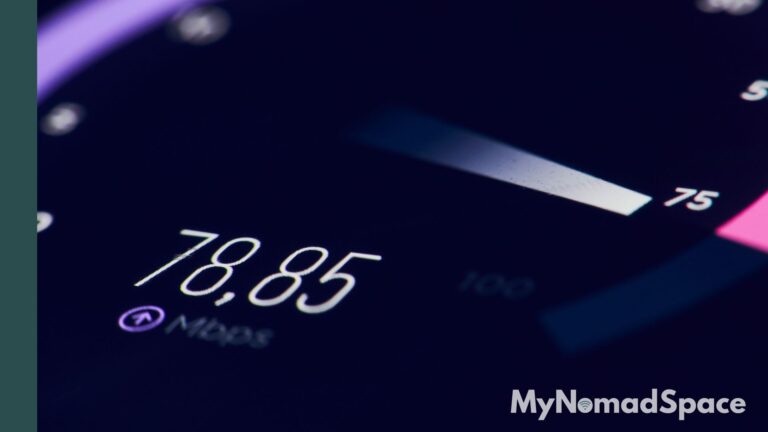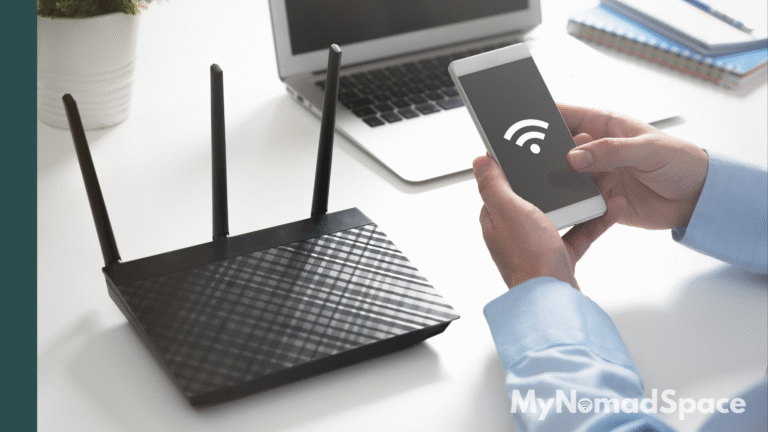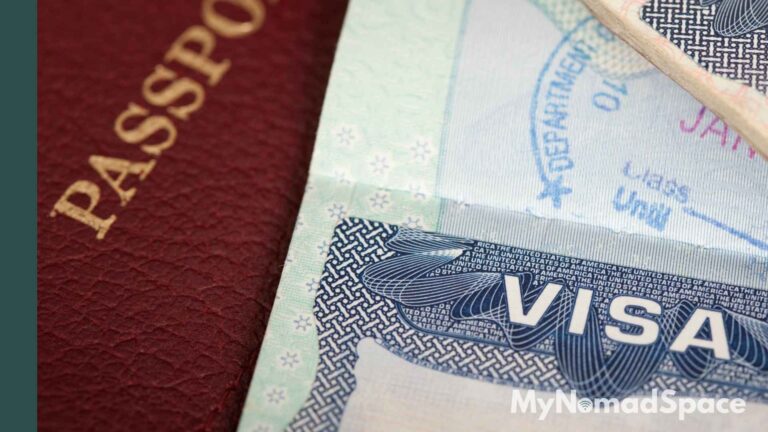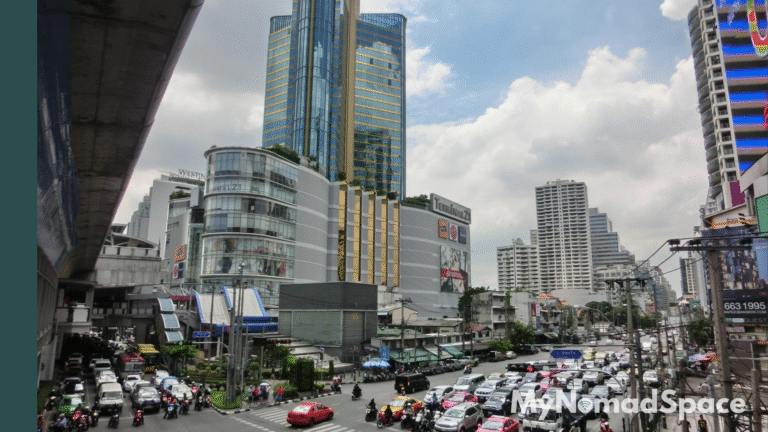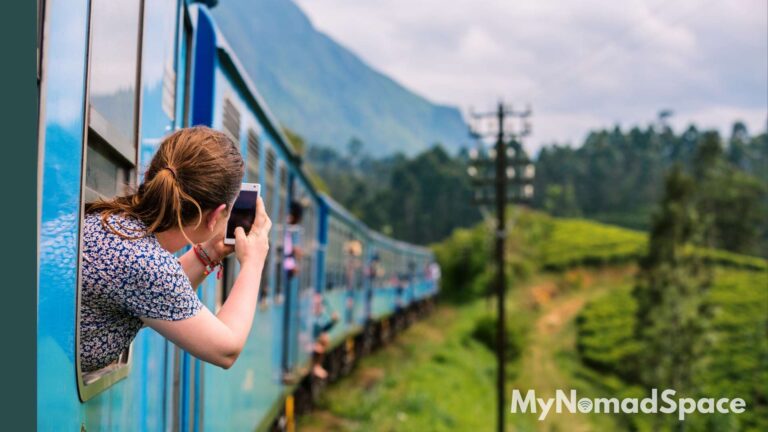How often do you see upload speeds listed when booking a place to work remotely? The truth is, almost never. Yet upload speed is one of the most important factors for remote workers, crucial for video calls, sending large files or collaborating in real time, so its absence is a big problem.
Chances are, you’ve encountered this before. Browsing Booking.com, you come across the rare sighting of an internet speed listed, but it is just the download speed that’s shown. Airbnb is much the same. Hosts can provide download speeds, but if you want to find upload speeds, you have to hunt through screenshots or long descriptions, and that is only if the accommodation listers provide them at all.
That is where My Nomad Space comes in. We are building a platform specifically for those who use accommodation for working, such as digital nomads and business travellers, who need more than just download speeds. Both upload and download speeds are verified on our website, alongside highly reviewed spaces that support the way you work and travel. But enough about us for now, let’s shine the spotlight on upload speeds. Here’s why they really matter.
Why upload speeds matter more than you think
Let’s quickly break down the difference between download and upload speed. In simple terms, download speed measures how quickly your connection receives data, while upload speed measures how fast data leaves your device. The faster both are, the smoother your online experience. Latency (the time it takes for data to travel from your device to a server and back) and other factors can affect performance too, but these two speeds form the backbone of a strong connection. They work together like a well-oiled team.
Ever been in a situation where you’ve managed to download something fairly quickly, but uploading felt like it was dragging? Or maybe you’ve been in a video call where the audio and video are lagging? That’s download and upload speed doing their thing (or not doing their thing, depending on how fast they are).
At the end of the day, slow upload speeds can be a major productivity killer, yet they often fly under the radar. According to Ookla’s Speedtest Global Index, the average global upload speed is 57 Mbps, a lot less than the download speed, which is much higher at 107 Mbps. Download speeds are generally higher than upload speeds because Internet Service Providers (ISPs) prioritise the data users receive over what they send. However, the gap is more than just numbers; it can make or break your workday.
Here’s the tricky part. Most people, including property owners, are naturally conditioned to focus on download speed. Aside from booking platforms, some of the most popular speed test sites only show download speeds unless you dig deeper. On your mobile phone, check the Wi-Fi settings; you’ll see download speed, but not upload. And since download speed is the number most often shown across these platforms and settings, it’s generally what people focus on.
When people run into sluggish connections, they usually check the download speed, which is often fine. But the upload speed – the real cause in many cases – is missed. Sadly, this blind spot can leave remote workers frustrated and struggling to get their work done. We’ve run into this problem firsthand as digital nomads, arriving at a property where the internet looks fine on paper but discovering that the upload speed, the real limiter for our work, is lacking. We’ve even encountered situations where the overall internet has been terrible, yet the host shows us the download speed and insists that everything is fine.
Ultimately, poor upload speeds can quietly undermine productivity, causing unwanted headaches, missed deadlines and disrupted days. For individuals making work happen around the globe from their laptops, ensuring reliable upload performance is essential for seamless work.
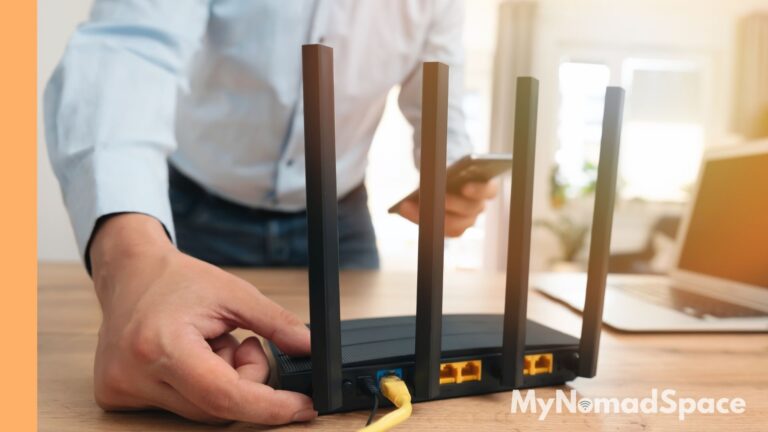
The issue with accommodation Wi-Fi
As we’ve noted, one of the biggest issues with major accommodation platforms is the lack of transparency around Wi-Fi speeds. The focus is almost always on download speeds, and many property owners don’t take advantage of the tools available to share this information. Even when some listings include it, the details rarely tell the full story. Some properties advertise “high-speed internet,” but without specifics, remote workers are left with little certainty about the connection quality.
Let’s take a quick look at Flatio. It’s a solid platform focusing on apartment rentals for digital nomads, and the website displays both download and upload speeds, which is a step in the right direction. But as of this writing, the website still lacks a solid base of reliable reviews on its listings, making it hard to know which apartments you can actually trust. We certainly hope they get there in the future.
In 2025, despite rapid technological advancements, finding verified Wi-Fi speeds remains surprisingly difficult. Outside of niche platforms like Flatio and Coliving.com, locating accommodations with reliable, verified internet can be an arduous task. Go on, see how long it takes you to find a highly reviewed space with solid Wi-Fi speeds? While some websites have begun experimenting with AI to find internet reliability by scanning major platforms, they still face a fundamental limitation. Without access to raw data, providing accurate speed metrics and dependability is virtually impossible.
We’ve experienced the challenge of securing Wi-Fi data directly while building this platform. When we have contacted or visited properties to enquire about Wi-Fi speeds, we often received only download speeds. After explaining the importance of upload speeds, many property owners admitted they didn’t even know what upload speed was, let alone how to measure it. It goes back to the earlier point of individuals being conditioned to focus on download speeds. This lack of awareness is a real barrier. And it’s one of the reasons why we built My Nomad Space.
Verified upload speeds: A game-changer for remote work stays
At My Nomad Space, we know that a key factor in a successful remote work stay is having a functional workspace that supports your day, whether it is a one-bedroom apartment or a coworking area at a hostel. That includes reliable internet, with solid upload speeds being especially important. Why does this matter? Simple: productivity. That’s why we’re making it a priority to list spaces with verified download and upload speeds, ensuring that you know exactly what to expect before you book.
No one else is doing it like we are, offering the variety of spaces we provide. We also give a full picture of each space by explaining why we’ve chosen to list it, so you can book with confidence using your preferred booking platform. In case you’re wondering, our upload speeds are verified through a combination of reliable sources, such as major booking platforms, real-time data from our own research, speed tests from top-reviewed spaces and even insights submitted directly by our community. We keep things clear, so you can book your next remote work stay with peace of mind.

How to test and ensure reliable upload speeds
These days, there are plenty of ways to test your internet speed directly. You can use platforms such as Speedtest by Ookla to see exactly what kind of performance you’re getting. Ideally, you’d want to have this information before arriving at a property. That’s where we come in.
When it comes to upload speed, you might be wondering what’s considered ideal. As a standard, we always recommend anything above 10 Mbps. That way, you can confidently do video calls, upload large files, back up your data to the cloud or stream content without interruptions.
It’s also worth keeping in mind that several factors can influence your internet performance beyond just the speed itself. Wired connections generally offer a more stable and faster experience compared to Wi-Fi, which can be affected by distance, walls and interference from other devices. If you find your speeds aren’t meeting your needs, consider asking your host to upgrade their ISP plan or even use a mobile hotspot as a temporary solution.
Additionally, be aware that VPNs can sometimes slow down your connection since your data is being routed through an extra layer of encryption and servers. Understanding these elements can help you make the most of your connection and ensure you’re getting the best possible online experience.
My Nomad Space is ahead of the curve
Upload speeds deserve more attention. We can’t stress that enough. For people who work and travel, or travel for work, knowing what to expect from a property’s internet connection is essential. One day, it will hopefully become standard for all major booking platforms and accommodation sites to show clear, verified upload speeds alongside their listings. Until that becomes the norm (if it ever will), we are here to fill that gap for working travellers.
Some accommodation providers are starting to catch on, though. More spaces are realising that reliable internet and clear Wi-Fi information attract long-stay guests, repeat customers and remote professionals who value consistency. Around the world, we are seeing the growth of coliving setups and workcation retreats that prioritise stable connectivity as part of the overall experience.
At the same time, technology is making it easier than ever to stay connected. Starlink is bringing fast internet to remote areas. eSIMs are giving travellers flexible data access without needing to swap SIM cards. Advanced mobile hotspots and portable routers now allow you to manage multiple networks or boost weak signals when needed. These tools are helping those who work remotely stay connected and productive wherever they choose to go.
Final thoughts on upload speeds
Upload speed plays a huge role in how smoothly you can work online. It affects many aspects of it. Whether you’re working from a bustling city like Bangkok or a beach location like Florianopolis, a decent upload speed means fewer frozen screens, quicker transfers and a more reliable workflow overall. For anyone who works remotely, it is not just about staying connected; it is about staying productive and stress-free.
But fear not, you don’t have to spend ages trying to find the perfect working base with both download and upload speeds provided. My Nomad Space does the research, gathers real data and shares verified Wi-Fi information from trusted sources so you can make informed choices before booking. Whether you are a digital nomad, workcationer or business traveller, My Nomad Space can help you find trusted accommodation that truly supports the way you work and travel.
As the world continues to embrace remote work, reliable internet will become one of the most important features any accommodation can offer. Until major booking platforms start showing this information as standard, we will keep doing our bit to make sure Wi-Fi speeds get the spotlight they deserve, especially upload speeds.
FAQs
What is upload speed?
Upload speed is the rate at which data is sent from your device to the internet. It determines how quickly you can send emails, upload files, post videos or participate in video calls.
How fast should upload speed be for remote work?
A minimum upload speed of 10 Mbps is recommended. This ensures smooth video calls, file uploads and cloud collaboration without lag or interruptions.
Why is upload speed often slower than download speed?
Upload speed is often slower than download speed because Internet Service Providers (ISPs) design networks asymmetrically, prioritizing downloading since most users consume more data than they send.

